Exponent II's Blog, page 22
June 17, 2025
Guest Post: Cognitive Dissonance, Confusion, and the New Garments
Guest Post by Calleen Petersen
When the new garments were announced, I was thrilled! I live in The South where it is so hot and muggy in the summer, peeling off your soaked, sweaty garments should be an Olympic sport! Sign me up for breathable fabric, sleeveless tops, and slips. Why are we releasing them in the 4th quarter when it finally starts to cool down???!!! We need them stat! There was also a part of this “reformed Molly Mormon” who also couldn’t wait to feel she was breaking some rules without breaking them with sleeveless clothes. I was going along riding this beautiful wave of anticipation for the new garments.
Then enters my daughter.
She’s been mildly pushing boundaries lately, as most 17-year-olds do as they prepare to leave home. It’s a rite of passage and a developmental milestone. In our house, we have never allowed tank tops. Years ago, I had a friend who chose not to get married in the temple because she would have to buy a whole new wardrobe. I had determined then and there that any daughters I had would dress in a manner that they would be prepared to wear garments. But a few years ago, my daughter joined the high school dance team and brought tank tops into our house as they were part of her uniform. I had grudgingly allowed it only for that reason. Now she wants to wear them all the time.
I should let her right? They’re approved now?
But the cognitive dissonance I feel after being told for the last 47 years that we had to wear the darn sleeves, slams its big fist down and makes me unreasonable. I’m all for wearing sleeveless for myself. Can’t wait. I’m not wearing them yet because I don’t have those garments. But to see my daughter in sleeveless tops and dresses makes me grip tighter. No, you can’t wear those! You aren’t allowed! Even though I mentally know it isn’t true, my brain screams, “She’ll never go through the temple if she wears those!” All of those reasons we were told we had to wear sleeves come tumbling out, and I’m left to wonder in confusion, did any of it matter? Or what does matter now?
To the younger generations- Please be patient with us who have been around a while as we try to recalibrate years of teachings and figure out how they fit into our lives. It’s a work in progress.

Calleen Petersen is a follower of Jesus, a therapist, a writer, a mom, and a wife who is just trying to find her nuanced way in the blazing hot South.
Exponent II Retreat Highlights From the Archives
There are only a few spots left! Consider attending this year’s Exponent II Retreat on September 19-21, 2025, at the Barbara C. Harris Center in Greenfield, New Hampshire! Learn more here.
The Exponent II retreat has been held annually in New England since 1983. Recently, the blog has been hosting a series to unlock the Exponent II retreat.
We’ve shared essays about the 1982 Pilgrimage that launched the network of Mormon feminist retreats, Laurel Thatcher Ulrich’s take on the Exponent II retreat’s history, the tradition of introductions at retreat Friday nights, Sunday morning Spiritual Autobiographies, reflections on woman-led rituals, and more.
While retreat attendees are asked to keep confidences about what is shared there to maintain privacy and trust, the retreat is not fight club. Not only can we talk about it—a good deal has been published about the retreat over the years! Below is a roundup of blog posts and archived essays about other aspects of the retreat experience.
Featured in Fifty Years of Exponent II (book)Don’t miss how Fifty Years of Exponent II, by Katie Ludlow Rich and Heather Sundahl, discusses the development of the retreat in the context of the rest of the organization’s history.
In the 50th Anniversary “reunion” issue of Exponent II (magazine)These thoughtful essays appeared in our special reunion issue. They’re behind a paywall, so subscribe if you haven’t already.
Kirsten Campbell on The Origins of the Exponent II Retreat QuiltsHeather Sundahl’s essay Retreat: Reflect, Reinvent, Reunite, RenewEmily Fisher Gray’s essay A Love Letter to the Exponent II Retreat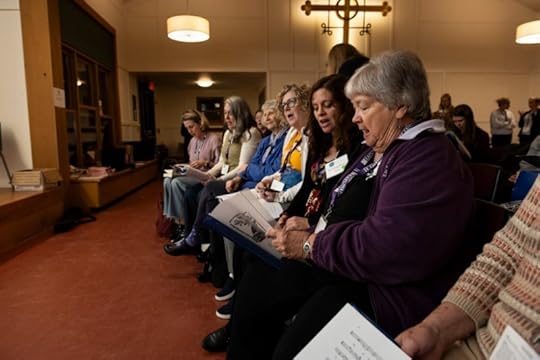 Photo Credit: Anna Ream
Photo Credit: Anna Ream Photo Credit: Anna Ream
Photo Credit: Anna Ream Photo Credit: Anna Ream
Photo Credit: Anna Ream Photo Credit: Anna ReamExponent II issues dedicated to the retreat
Photo Credit: Anna ReamExponent II issues dedicated to the retreatIn addition to essays scattered throughout Exponent II’s history, three issues focused primarily on the retreat. Use the “search text contents” feature in the digitized collection on archive.org to find more!
Fall 1983 – Reflections from the first open-registration retreat, then called a reunion Winter 1984 – Featuring Virginia Sorensen and Esther Peterson + Sister’s Speak reflections Fall 2000 – Includes essays on the Exponent II, Rocky Mountain, Provo Canyon, and Midwest Pilgrims retreatsSelect retreat essays from the blogIn 2007, blogger Caroline asked: Should Mormon men have retreats too? Readers chimed in.In 2012, Jessica Steed shared advice on organizing a Mormon feminist retreat, based on her experience with the Southwest-based Sophia Gathering.In 2013, Libby wrote: “Retreat’s Going to Make Everything Better.”In 2015, Pandora shared what she loves about retreats in “Retreat Forward.”Blog posts featuring the retreat variety show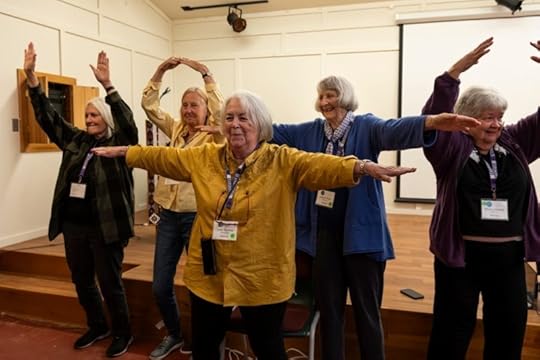
 Photo Credit: Anna Ream
Photo Credit: Anna Ream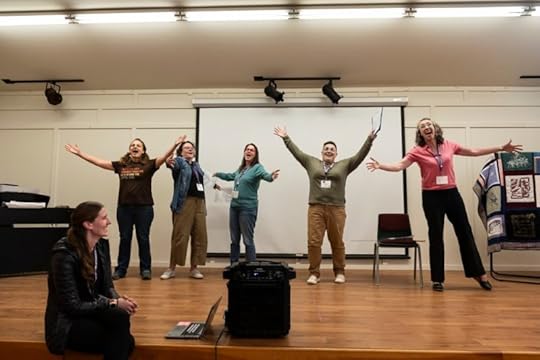 Photo Credit: Anna Ream
Photo Credit: Anna Ream Photo Credit: Anna Ream
Photo Credit: Anna ReamSaturday night features a keynote speaker, followed by a variety show—an eclectic mix of music, comedy, storytelling, and surprise talents that never fails to bring the house down.
Every year, the variety show gives Heather a chance to channel her inner Weird Al—rewriting hymns and pop songs for a Mormon feminist crowd. Thankfully, some of those songs live on in our archives:
The Modesty SongPersisters in Zion/Daughters of Exponent: A MedleyDon’t Call Me MormonChallenge PatriarchyCome Ye Husbands of the WardLast year, for Exponent II’s 50th anniversary, my friends and I asked ChatGPT to roast Exponent II for our variety show skit. It hurt our feelings and made us laugh: “Exponent II: Celebrating 50 years of making patriarchy nervous—but not too nervous. Unlike that radical Mormon Women’s Forum, you’re the polite feminists: you’re here to stir the pot, but only with an approved spoon, right?” Ouch.
Not fight club—but still sacredThe Exponent II retreat is not secret. It has advertised open registration calls from the beginning. But it is sacred. It’s sacred in the way that women and gender minorities show up for each other—joyful, questioning, grieving, hopeful. It’s sacred in the stories shared, the silences held, and in the squeeze-your-knees-together-to-stop-from-peeing laughter that bubbles up on the trails around the lake. Whether you’ve been coming for years or are just now learning about it through this series, we hope something here has stirred your curiosity or your spirit. This retreat is more than a weekend; it’s a community.
Don’t miss updates for future retreats—sign up for Exponent II’s monthly newsletter!
June 16, 2025
Mental Exercise: Let’s Visualize What Teenage Girls Marrying Polygamous Men in the 1800s Actually Looked Like
In my local headlines this month, a 15-year-old girl was found alive after disappearing for six weeks. Three older men in their thirties or forties were arrested in connection to her disappearance. This leads me to the question…
Would early Mormon prophets be in jail if they lived in 2025?
Something about early church polygamy (which included way too many teenage girls married to older, powerful men) continually sucks me down rabbit holes that make me want to stand on the street corner of my heavily LDS Utah County town and yell, “DO YOU ALL NOT REALIZE THE CHURCH WAS FOUNDED BY ADULT MEN MARRYING TEENAGERS?!”
Unfortunately, that would absolutely backfire because nobody seems to care. We build statues to these men and quote them at church and write hymns singing praise to them.
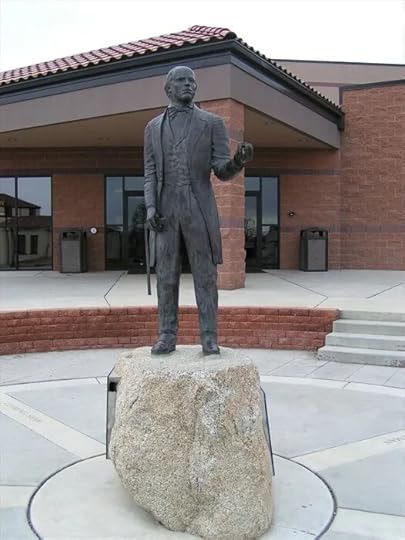
The day I wrote this post I was in a class at my local rec center (where I’ve attended for 21 years) and we took our workout to the front lawn. I did jump squats and lunges and ran laps on a sidewalk that passed next to a founding father of Lehi, Utah, pictured above – David Evans. (Nothing weird there – just doing burpees at the feet of a 57-year-old man who impregnated an 18-year-old girl when he was already having babies with his wife and five other women.)
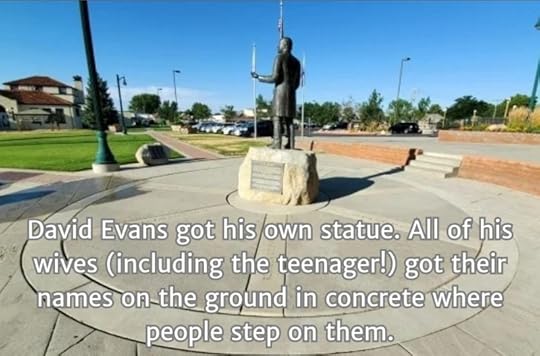
Right before my workout class I had read a news story about a 15-year-old girl who had been missing for six weeks, found safe in Colorado. She disappeared from her American Fork School (right across the freeway from Lehi, where I live) after messaging online with three different adult men (one who was 35, one who was 37, and one who was 41). All three of those men were arrested.
This is what adult men look like:

This is what a 15-year-old victim looks like:

She’d been on missing posters since April.
I have big feelings of protection for that teenage girl. She probably was arguing with her parents. She probably thought she was using her own free will to interact with these older men. She probably thought she was mature for her age and was genuinely a love interest to them. She probably thought they were on an equal playing field and she was in relationships where she was respected and safe.
Nobody else thinks that though, and the law certainly doesn’t.
Any adult can see that she was groomed and abused by adult men who should have known better. That’s why those three men are under arrest, and this girl will get therapy and support. It’s never okay for an adult man to pursue an underage teenage girl. She is not his equal. Her brain isn’t developed and his life experience greatly outweighs hers. Any relationship with this kind of age gap is predatory and wrong. I don’t think this is a controversial opinion that I hold!
And yet…
This is Martha Ann Hughes, who was 14 years old when she was given to 68-year-old Zera Pulsipher as a plural wife. He was the president of the seventy and famous for having baptized Wilford Woodruff. And then…he had sex with a teenager.
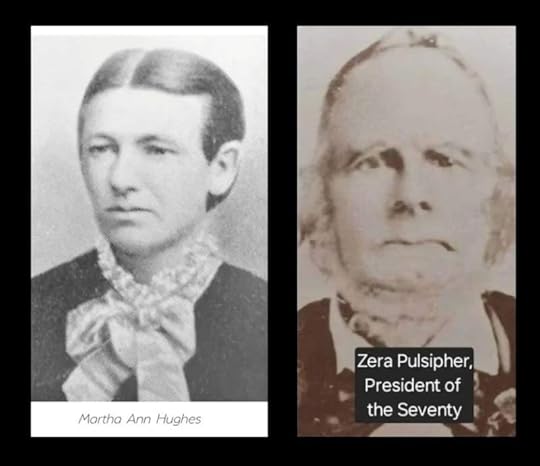
So here’s my hot take:
All teenage girls pursued by adult men – regardless of the century – are victims!
And…
Joseph Smith married a 16-year-old when he was 32, then a 16-year-old, a 14-year-old, and a 15-year-old when he was 37.
Brigham Young sealed a 15-year-old girl to himself when he was 42, a 16-year-old girl to himself when he was 43, then another 16-year-old at 44, and another 16-year-old when he was 45.
John Taylor was 47 when he married his 16th wife, a 16-year-old girl.
Wilford Woodruff married six out of his ten wives as teenagers and later would seal himself to hundreds of girls and women on birthdays in his seventies, including a 6-year-old dead girl.
Lorenzo Snow married nine women – six of whom were teenagers. When he was 57, he married his last wife when she was 16 years old.
Joseph F. Smith married both a 17-year-old when he was thirty, and an 18-year-old when he was pushing fifty.
Modern day church members defend these men, saying things like, “They probably weren’t having sex with the younger brides until they were older.”
Guess what the three men recently arrested all said? “I wasn’t going to have sex with her until she was older.”
If you happen to watch some of the Law and Crime Network videos covering this case that I linked to at the very beginning of this post, you’ll know that these “sick” men were arrested for having sexually explicit online conversations with this girl – but none of them had physically touched her. They’d never even been in the same room as her. By contrast, Mormon leaders in the 1800s were actually having sex (repeatedly) with girls. We know because these girls were having babies before they turned eighteen.
But let’s pretend (for the sake of this argument) that this actually was the case, and all of these men were entering relationships with a 15-year-old girl that wouldn’t become sexual until after she was 18 years old. It’s still wrong.
It’s wrong for a girl to leave her home and become a wife/future romantic partner of someone twenty years older than her, even if he doesn’t sleep with her immediately. He’s stealing her youth. He’s taking away normal development opportunities to date boys her own age. He’s taking away her opportunity to become who she wants to be outside of his wife and future sex partner.
If you are 15 and your 40-year-old male partner isn’t having sex with you – but you know that in exactly three years you’re expected to lose your virginity to him, and you aren’t allowed to have a boyfriend your own age (or even go on a date, or flirt with a teenage boy) because you’re promised to him – that man still owns your sexuality.
Don’t tell me that one of these is wrong, and the other is fine.

As I write this, my 16-year-old daughter is getting her wisdom teeth out. She asked me to stay with her as they put the IV in because she was too scared to do it alone.
She’s afraid to be alone in a safe place with a male anesthesiologist for a small poke in her arm before she falls asleep for a dental procedure.
When I imagine a 16-year-old girl given to a 40-year-old man as his plural wife and then sent alone to consummate the marriage with him (with no mom there to hold her hand and comfort her), I want to scream. It was statutory rape, even if it was the 1800s and the men said some religious words that pronounced the girls their spiritual wives before they did it to them. To imagine my 16-year-old daughter pregnant from one of these bearded polygamous men – even if they say God told them it was okay – makes me feel violent. I almost want to tar and feather them, or maybe chase them out of my community or burn down their temple where they marry themselves to teenagers.
Why will the church not call out what was obviously wrong behavior? Is it because the perpetrators are important men?
It almost makes you wonder if early church leaders were persecuted by mobs for reasons other than just how awesome their church was.
June 15, 2025
Patriarchy is Exhausting
Some people will forever remember being in the audience for a Beyonce or Taylor Swift concert, but Stassi Cramm’s ordination service on the evening of Sunday, June 1 is my equivalent. That evening, she became the prophet-president for Community of Christ and the first woman to serve as the leader in a Latter Day Saint church.
Earlier this month I was at Community of Christ’s World Conference in Independence, Missouri. I was there to give the John Whitmer Historical Association’s Wallace B. Smith tribute lecture with my colleague David Howlett. We spoke about how people changed their minds about women’s ordination during and after the 1984 World Conference.
While I was excited about giving this talk, I was most excited about the vote to approve Stassi Cramm’s call to serve as the prophet-president of Community of Christ and the ordination service that was tentatively planned for after the vote.
On Saturday morning, the conference officially opened with a procession and ritual from a local indigenous group, hymns, and further blessings on the proceedings. We heard testimonies from the outgoing First Presidency. At the end of their testimonies, the First Presidency was officially dissolved and Mareva Arnaud Tchong, president of the Council of Twelve Apostles stood at the podium to preside over the conference. Mareva brought forward Stassi’s call to be approved.
Afterward, Katie Harmon-McLaughlin, Director of Formation Ministries, described the discernment process that produced Stassi’s call. Apostles Angela Ramirez and Lachlan McKay both described their experiences of naming a new leader, describing Stassi’s long career in full time church ministry and also bearing their testimonies that they felt her call come from the Holy Spirit. A descendant of Joseph and Emma Smith, he referenced Emma ordination and how she would likely be smiling down on the conference proceedings.
Priesthood quorums (filled with adults of all genders from around the world) discussed Stassi’s call that afternoon and reported back to the conference delegates and observers on Sunday afternoon. Priesthood quorum support for Stassi’s call was nearly unanimous.
Then the delegates voted. From my seat as an observer in the Auditorium balcony, I could see the delegates seated by mission (stake) center on the conference floor. When Mareva asked the delegates who approved the call to raise their hands, it was nearly unanimous and the energy in the room was intense and exciting. It seemed like only 10-20 delegates raised their hands to vote no.
Mareva asked those who were participating in groups at remote locations to vote, the children’s caucus voted, and as a conference observer, I was invited to raise my hand to approve Stassi’s call. I was glad to participate in this way. It was an everyone-crying-tears-of-joy experience.
It is hard to communicate how joyful, celebratory, and healing it was as a former-Mormon-now-ordained-Community-of-Christ-elder to raise my hand. With so many things going so terribly wrong in the world (wars, fascism, etc) particularly during the last year, collectively we were all desperate to rally around something good and squeeze every last drop of good feeling out of the moment.
When Mareva announced that the motion to approve Stassi’s call had passed, Stassi returned to the Auditorium while the congregation sang two hymns whose lyrics had been composed by one of the church’s great and recently passed powerhouses, Barbara Howard. Instead of being able to process down the aisle and up to the stage, Stassi was hugged down the aisle by delegates. People of all genders, priesthood holders and regular church members, were excited to participate in this sacred process.
The ordination service was on Sunday evening. I got there 75 minutes early to get a good seat and to hopefully hold some seats for friends – other former Mormons who had converted to Community of Christ. When I arrived at the Auditorium, the other early folks were mostly older women who shared my commitment to getting a good seat for this momentous event.
Grammy award winning organist Jan Kraybill was in top form and her playing communicated so much energy and celebration.
Choirs from Africa, Tahiti, and Independence all sang in celebration.
One of my favorite parts of the service was Mareva’s charge to Stassi, where she gave strong words of counsel for this responsibility because “We are not here to crown a leader” (timestamp 47:31).
When it was time for the ordination to take place, Stassi invited friends and family from around the world to join her on the stage. There were older folks together with young adults and babies and toddlers, together with Stassi’s grandchildren. The now-former prophet-president Steve Veazey and Mareva laid their hands on Stassi’s head and performed the ordination.
The closing hymn was The Spirit of God Like a Fire is Burning (sung in English, French, and Spanish) and I have never felt such intense joy in congregational singing. By the last verse, the volume of the organ was at 11.
By the next morning, I had a church hangover, but I was so glad to witness this.
And so, to the point of my title, during the sessions of opening, voting, and the worship services in between, I saw people of all genders from a variety of places speaking English, French, and Spanish, Tahitian, and Portuguese on the stage doing the work of the church together. While we had gathered to made decisions about church leadership and policy, the whole conference experienced reminded me that we all participate in the work of the church because church is not about the person at the top, but about the work we do together. Church is a team sport.
To my final point: to create, educate, and cultivate a community where women and gender expansive folks are excluded from meaningful decision making and from performing nearly every ritual and ordinance in the church is an awful lot of work. It takes curriculum writers, leaders at all levels, and women gate keepers to carefully and consistently police boundaries and make it unthinkable for all people to fully participate in the life of the church. To sustain that level of exclusion as a community norm that is rarely challenged over generations is downright exhausting. It takes so much work.
So while people often talk about the difficulty of inclusion work, and creating inclusive communities *is* hard, let’s also remember that the work of exclusion is probably harder, but we’re just used to it. The machinery of exclusion is a constant loud churning in the background of our lives. Patriarchy is exhausting.
June 14, 2025
Happy Pride Month

Photo credit: Arvinjaygaa WikiMedia Commons
Trigger warning: suicide
Happy Pride Month! I celebrate Pride Month because everyone has value, especially those marginalized by their cultures, countries, or churches. I celebrate Pride Month to encourage my LGBTQ+ friends to stay alive and to thrive. I celebrate it because everyone deserves the right to marry the one they love. I celebrate it because I love my LGBTQ+ friends and family members and because I want them to know that I do. I celebrate it because I want all governments, churches, and institutions to recognize that LGBTQ+ people are human beings who deserve the same respect, rights, and privileges as anyone else.
The rainbow flag was created by renowned San Francisco activist Gilbert Baker, who said that “the rainbow of humanity” symbolizes all genders and races. Each of the six colors of the rainbow flag represents a different aspect of the LGBTQ movement: life, healing, sunlight, nature, serenity, and spirit.
If you attend church, work, or pursue daily activities, wearing a rainbow pin, bracelet, or wristband signals to LGBTQ+ folks that they are safe with you and that you care about them. This allows you to comfort those who need comfort and to show that you practice the Golden Rule. How many cisgender folks would feel happy if their churches told them they could not marry the partner of their choice, use a restroom, teach a class, or attend a meeting with folks of their gender? Wearing a rainbow pin or emblem is a simple way to show that you believe everyone deserves love and respect.
During Pride Month, let’s remember that in 65 countries, it is a crime to love the wrong person, and in 12 countries, this is punishable by death. In addition, 50% of LGBTQ youth report being bullied in the last year. Among LGBTQ middle school students, 29% of those who were bullied attempted suicide in the past year. LGBTQ students who reported their school to be LGBTQ-affirming had odds that were 30% lower of being bullied in the past year. I celebrate Pride Month because being LGBTQ affirming saves lives.
I was raised in a homophobic church, a church that refused to accept LGBTQ members as beloved children of God. My church once taught that being LGBTQ is an evil choice. My transgender neighbors must be accompanied to the church restroom by a supervisor. No transgender person, to my knowledge, has ever abused an LDS child at church, but plenty of heterosexual men have. Perhaps, they should be accompanied to the restroom. And, surely, to make all feel welcome, churches should provide individual restroom facilities.
I grew up in a church where leaders taught that being gay was an “unpardonable” choice and that you could pray gender attraction and identity away, a doctrine that destroyed many lives before it was reversed. Although he has denied it, a current top church leader allowed horrific electroshock and vomit aversion as a form of “gay conversion therapy” during his tenure as president of Brigham Young University. Although the LDS Church refuses to apologize for this horrific treatment, I say to anyone who suffered from this, I am deeply sorry.
Biblical scholar Dr. Dan McClellan wrote an outstanding book, The Bible Says So, that describes, among other things, how the Bible has been misused to attack, marginalize, and abuse the LGBTQ+ community. He writes that the “biblical” position on homosexuality is just as negotiable as slavery, polygamy, and other positions. Dr. McClellan writes that the main reason so many conservative Christians today “so publicly…condemn homosexuality and wave their Bible around at their authorization… is precisely because that condemnation has become a central identity marker.”
He adds, “I believe there will come a day when conservative Christians will have grown out of such callous and harmful identity politics, but what I cannot predict—and what has kept me awake late into many nights—is how many bodies will be heaved onto the altar of those conservative Christian identity politics in the meantime, and how many of their faces I will have known and loved.”
I belong to a church whose leader once said, “Our knowledge of God’s revealed plan of salvation requires us to oppose many of the current social and legal pressures to retreat from traditional marriage or to make changes that confuse or alter gender or homogenize the differences between men and women. We know that the relationships, identities and functions of men and women are essential to accomplish God’s great plan.” This talk made some LGBTQ+ members feel like outsiders in the Church, folks who are already at higher risk for suicide. For this I say that I am sorry.
I also belong to a church that “bars people from being baptized even if they have transitioned only socially, by changing their appearance, name or pronouns,” will not allow transgender members to attend gendered meetings of their choice, and will not allow them to teach children or youth. For that, I say, I am deeply sorry.
I belong to a church that punishes transgender members who transition with membership restrictions and even excommunication. I grieve that any religion would oppress God’s children, and again, I say, I am sorry. Treating our beloved transgender members like this is unacceptable and wrong.
Scriptures can be used to condone slavery, polygamy, murder, racism, misogyny, genocide, and a host of other atrocities, or they can be used to encourage kindness, compassion, generosity, mercy, and a host of other loving behaviors. Leaders and members of churches should evaluate whether their doctrines harm or help others. May they choose wisely which doctrines and policies they adopt and implement.
Jesus did not condemn LGBTQ+ folks but had a lot to say about those who are unkind and cruel, especially those in church leadership. He said, “Woe to you, teachers of the law and Pharisees, you hypocrites! You give a tenth of your spices—mint, dill and cumin. But you have neglected the more important matters of the law—justice, mercy and faithfulness (Matthew 23:23 NIV). His final charge to all is to “love one another. As I have loved you, so you must love one another.”
To all my LGBTQ+ friends who long for love and inclusion, I see you. I hear you. I love you. Thank you for adding incomparable beauty, joy, and goodness to the world. This month, and every month, I celebrate the many things you have taught me about kindness, compassion, and goodness. As Brené Brown says, “Owning our story and loving ourselves through that process is the bravest thing we’ll ever do.”
Happy Pride Month to all.
 sLedziennicasanrp_KJJ
sLedziennicasanrp_KJJ
Photo: Katowice Pride Author: Silar WikiMedia Commons
June 13, 2025
Mission Microaggressions and 3 Reasons I’m Glad I Wasn’t “Called to Serve”
“You just need to pray harder!”
“I only want to date/marry a girl who is a returned missionary.”
“If you’ve gone on a mission, then you’ll recognize this scripture/conference talk/gospel principle…”
These examples, along with constantly being asked where I served my mission or why I didn’t serve one, are all microaggressions that I experienced firsthand after deciding not to go on a mission at age 19.
 Photo by Bailey Burton on Unsplash
Photo by Bailey Burton on UnsplashGoing on a mission always felt like it would be part of my life plan growing up because both of my parents had served missions. Then the age change happened when I was in junior high, and many girls my age started feeling that it was something they were excited to do. But the closer I got to 19, the less it appealed to me. After much prayer, I was devastated when I was not blessed with a feeling that God wanted me to go or even a desire to serve a mission. It felt like all of my friends were going and I was being left behind.
One particular microaggression stands out in my mind now almost ten years later. I road tripped with a few friends to visit a temple open house one weekend. At the beginning of our tour, a senior missionary sister asked us whether we were “future or former missionaries?” One by one, my three friends answered that they were returned sister missionaries. When it was my turn, I blushed and said “Neither?”
The sister missionary corrected me, saying that I was a future missionary since I could serve a senior mission with my husband someday.
I felt so angry and confused after that encounter. Was I doomed to spend the majority of my life being referred to as a “future missionary?” I didn’t even have a husband yet! Wasn’t it too soon to be making plans for spending our retirement together? Why was I asked to define myself dichotomously and simplistically by this senior missionary?
“Was I doomed to spend the majority of my life being referred to as a “future missionary?”
Missions are not a saving ordinance, in fact they are not an ordinance at all. Missions are not lifelong, they last 2 years or less. Why do so many church members continue to define each other by this one decision? We talk as though the only thing you need to know about someone to ascertain their character is whether they are a returned missionary or not. As though plenty of terrible people are not also returned missionaries.
It’s important to note here that church leaders have consistently taught that women should not feel pressured to serve a mission, but the culture surrounding missions is such that I did feel this pressure from other members. I can only imagine the amount of pressure that young men must deal with when they likewise choose not to serve a mission, since there is an expectation from church leaders for men to serve missions.
 Photo by Isaac Quick on Unsplash
Photo by Isaac Quick on UnsplashI’m not someone who likes to stand out, so being one of the few in my circle who did not serve a mission was a point of discomfort for years. It still is sometimes.
Now, with a fully developed prefrontal cortex, here are some reasons I am glad I didn’t serve a mission:
ScrupulosityBetween my eager to please disposition and the orthodox way I was raised, I thrived on rigid structure and lists of “dos” and “don’ts” for most of my life. I was the weird kid who came home from my first day of kindergarten excited about all of the new rules to follow. I scoured the “For the Strength of Youth” pamphlet as a young woman. This was back in the day when it specifically taught not to wear bikinis, and forbade “petting,” or “necking” (whatever those are). Before and after getting endowed, I scrutinized endowed members’ clothing choices to see whether they were wearing their garments, and judged those who weren’t.
I fear that if I had served a mission, these tendencies would have developed into full blown scrupulosity (religious OCD) in an environment where I would repeatedly be told that “exact obedience brings miracles,” and have a full set of new, sometimes pointless rules to follow.
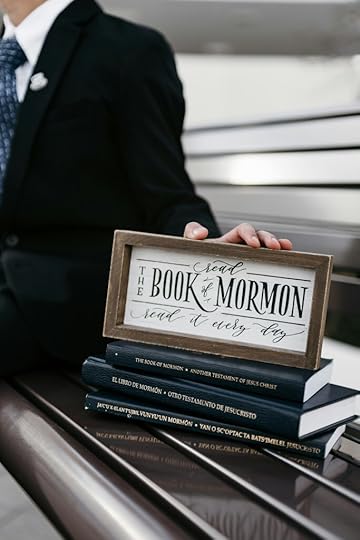 Photo by Pau Patterson Photography on Unsplash
Photo by Pau Patterson Photography on UnsplashInstead, I’ve spent the last few years unlearning hurtful attitudes about living the gospel and my worth. While it has taken me a long time to unlearn my judgmental, “letter of the law” tendencies, I feel that I would have a harder time doing this had I served a mission, since I likely would have had more baggage to sift through.
For example, I can’t imagine the 180 degree shift from not being allowed to interact with the opposite sex in normal, organic ways as a missionary, to being told to get married as soon as possible once I got home. Dating in my young adult years was complicated enough without arbitrary mission rules getting in the way!
Choose Your Own AdventureDealing with these mission microaggressions (however innocent many of them were) forced me to develop thicker skin. I learned to care more about what God thought of my decisions than what friends, family, and random acquaintances thought of them.
Not taking the same natural step forward as my peers forced me to develop my own life plan and not do the same things as all my friends. My life plan sans mission included excelling in school, going on three study abroad programs, getting a master’s degree, and receiving my endowment.
Going against the grain and developing thicker skin has served me well as I now navigate engaging in a church community where my ideas and values feel increasingly counter cultural. Had I not experienced something similar with my choice not to serve a mission, I would worry about my ability to exist in this nuanced gray area for long.
 Photo by Haley Black: https://www.pexels.com/photo/woman-ta... and Emotional Safety
Photo by Haley Black: https://www.pexels.com/photo/woman-ta... and Emotional SafetyYou may be familiar with the @ldsmissionwellness_stories account on Instagram. Between the stories that returned missionaries submit to that account and anecdotes I hear from friends and family who served, I am relieved that this was not my lived experience. I have read stories of abuse from companions, domineering mission presidents, food insecurity, lack of access to routine and emergency healthcare, extreme leadership roulette, stalking, and violence experienced by missionaries.
“The church is not to blame for the actions of others (such as abusive companions, or those who antagonize missionaries), but they are responsible for the lack of resources many missionaries and mission presidents have while dealing with these problems.”
Missions are naturally difficult as sisters and elders will inevitably face rejection by investigators, culture shock, language barriers, or adjustments to being with a companion 24/7. But missionaries deserve to feel physically and emotionally safe. We do not need to make missions harder than they naturally are to “toughen up” the next generation or to test their faith.
 Photo by cottonbro studio: https://www.pexels.com/photo/person-i...
Photo by cottonbro studio: https://www.pexels.com/photo/person-i...The church is not to blame for the actions of others (such as abusive companions, or those who antagonize missionaries), but they are responsible for the lack of resources many missionaries and mission presidents have while dealing with these problems. While policy changes in recent years have improved quality of life for missionaries (e.g., weekly video chats, and sister missionaries wearing pants), there is still much room for improvement.
My HopesAt a time of life when most emerging adults typically gain independence over their finances, living situation, time management, and relationships, missionaries surrender control to the church to dictate each of these areas. I’m grateful that my emerging adult years were more autonomous than this.
 Photo by Bailey Burton on Unsplash
Photo by Bailey Burton on UnsplashI hope to be supportive of my children’s agency and will try to support them if/when they serve missions someday. I know I will feel anxious about them experiencing these difficulties. My hope is that they will feel comfortable sharing hardships they go through as missionaries with me, without feeling like they need to censor them to be more obedient or faithful. My hope is also that if they decide not to serve missions, they won’t be met with the same cultural pushback that I was at 19.
I hope that by talking about and addressing things that can go wrong in regards to missionary service, we can discontinue hurtful microaggressions and improve missionaries’ access to needed resources.
Submit a guest post! Learn more about our post guidelines and use the submission form on our guest post submission page.
June 12, 2025
Guest Post: Defenders of Light
Guest Post by Ann Goebel

Just recently, I travelled to Philadelphia. One of the days of my trip, I made it a point to spend time going to various old churches in the city. I was really excited to see the Arch Street Meeting House where the Religious Society of Friends (Quakers) meet. I know very little about this religion, but I have always been intrigued by descriptions of quiet and contemplative religious services and the mention of many Quaker communities being LGBTQ friendly. Now, I am sure this faith tradition and its members are imperfect in their own ways, and I would hate to overly idealize them. However, I anticipated that I would fill my spiritual cup that day.
When I arrived, I noticed a sign posted in the grass announcing that immigrants were welcome. I smiled, and continued indoors. The man behind the front desk was kind and inviting, and I felt welcome. To my understanding, the meeting house is still in use today, but the first floor is a beautifully simple museum with signs posted explaining the history of the building and Quaker beliefs.
I learned that this Society of Friends was a group of pacifists, but there was a group that split off during the Revolutionary War because they wanted to take a more active role in the fight for sovereignty. I learned that Quakers believe in an Inner Light, which some identify as the Christian God while others view as a general divinity and spirituality found within us all. I learned that Quakers were vocal abolitionists of slavery and have a tradition of fighting for social justice.
I was quiet as I explored the rooms, enjoying learning from these signs and then taking in the quiet reverence of the space. As I pondered, I wandered over to the front of where the congregation would meet to read a final sign. I read these Quakers did not typically have one person designated to address the congregation, but there would be a community of people on the stand. I looked at the rows in front of me (three or four rows with a middle aisle creating six or eight long benches), and I smiled at that idea of communal teaching.
My gaze returned to the sign, and I inspected the black and white photograph more closely. Before I could fully process what I was seeing, tears filled my eyes. The left half of the front benches were filled entirely with women! I did a double take, and reread the sign.
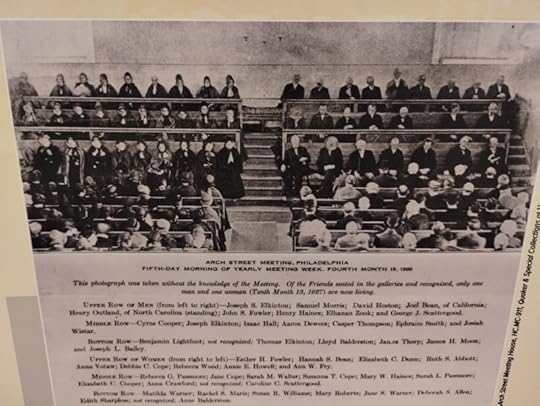
To my amazement, it made no mention of equal gender representation! I was shocked. I knew, of course, that many religious groups have female ordination, and I was well-aware of the LDS Women on the Stand movement. But what most shocked me was the nonchalant way that it was not even mentioned, as if it was not the huge accomplishment that I had come to believe it is. Nothing in the sign said, “look at how awesome we are that we look for equal gender representation! How amazing that we have accomplished something so wildly progressive!” In this space, this small act of gender equality was not treated like a huge modern feat but a common-sense way of living and worshipping.
I sat in a pew and wept for a few minutes, my heart aching. Is this what I’ve been missing out on all this time? How often have I taught myself to fight for and be profoundly grateful for mere breadcrumbs? If my church experienced this kind of egalitarian leadership and representation, is this the kind of environment we would create? One that is safe for immigrants, safe for sexual and gender minorities, safe for women, safe for African Americans, safe for the poor, safe for all?
As I sat there, I imagined strong women and men who have been empowered through Quakerism, their personal spirituality and faith community helping them use their talents for meaningful social causes. I closed my eyes, filled with both pain and sorrow for my own church’s long-standing oppression of women. But through that pain, I felt gratitude for that moment and a deep spiritual connection to something. In that Quaker meeting house, I imagined I was seen and known by something bigger than myself. I pictured warm, expansive light filling my soul, and it called on me to let my light so shine. It called on me to not hide it under a bushel, but to share it. It asked me to defend that light in my brothers and sisters.
Ann Goebel is grateful for the spiritual education she received as a youth in her progressive Mormon household. Her undergrad is in political science, and she loves thinking about how different institutions impact our lives (even though it often makes her anxious). She enjoys spending time with her husband, calling her grandma, birdwatching, discussing books with friends, and eating mapo tofu.
Rainbows: A Symbol of Love
A few years ago, the universe spoke to me. It spoke with an image of arched light and color that connected the words of a stranger to the movement of my body. My cheap-soled shoes hit the pavement in rhythm as I ran; the poisonous particles that had been floating in the Utah air for months, blocking the mountains from view and hindering my daily runs, had evaporated. I was running in clean air for the first time in weeks. It felt amazing.
On my run I listened to a podcast, Be Brave Like Blaire, a conversation with a Queer Mormon woman, Blaire Ostler, about her book, Queer Mormon Theology. She read a chapter from her book, a chapter about Christ’s atonement. That word, atonement, and that incomprehensible and overstated moment described in scripture had interfered with and confused my life for years, similar to that tragic smoke and invisible PM2.5 that I can’t see but restricts and isolates me from what I love.
However, Blaire spoke into my ears, giving new meaning to the word, reimaging the moment that others have used to exclude and confine love. She said, “Jesus went into Gethsemene a he and came out a They.” Blaire read that chapter into my ear, about how we cannot comprehend the atonement, but we can imagine, can hope, that Jesus felt all pain – male, female, and everything in between. That queerness isn’t something we just need to accept- it is eternal, divine, and human. That love doesn’t have borders or rules; it accepts everyone. Every one.
Blaire’s ideas and words brightened synapses in my brain, creating neurons and pathways with energy. She described a Jesus and a God that made sense to me, a moment that mattered because all borders and hate dissolved when Jesus stepped across the threshold of their tomb.
Just then, a rainbow spread across the sky; a symbol of LGBTQ+ communities, diversity, unity, and light from the universe. Goose bumps danced on my skin as I ran below a symbol of clean air that heals rather than the minuscule particles that penetrate deeply into the lungs, irritating and corroding. I ran with that rainbow for a few minutes as it got brighter and brighter, and another, fainter rainbow appeared above it.
Two rainbows after weeks of brown skies. I felt like the universe playfully displayed its love for queer people in an incredible display of science. Then it dissolved, and I kept running and listening about queerness and love, breathing fresh air. It was a beautiful miracle. I felt like I witnessed the universe celebrating with Blaire and Jesus in a color fest that said: Love!
Later that day, I danced in the rain with my daughter and jumped on the wet trampoline. Both of us jumped up, meeting the rain in the sky, and then fell down to the earth with it. I felt one with the universe that day: rainbows, human stories, rain, and gravity. For a moment, the air was clear enough to breathe.
June 11, 2025
Guest Post, Polygamy: The Doctrine that Lives In Our Bones
Polygamy: The Doctrine that Lives In Our Bones
The weight of my foremothers’ pain, the doctrines that keep it alive—and the daughter I hope never has to carry it
It started with a familiar ache in my chest. I’ve felt it before- the moment polygamy shows up where I least expect it.
We walked past a sculpture on display at the very front entrance of the Covey Center in Provo while waiting for my 8-year-old daughter’s call time. She started reading the description out loud. At first, it sounded beautiful, something tender, honoring love and loss. I skimmed ahead of where she was reading, and suddenly the moment changed. The artist said the piece became “complicated” once he was sealed to a second eternal companion—something only men are allowed in Mormon doctrine.
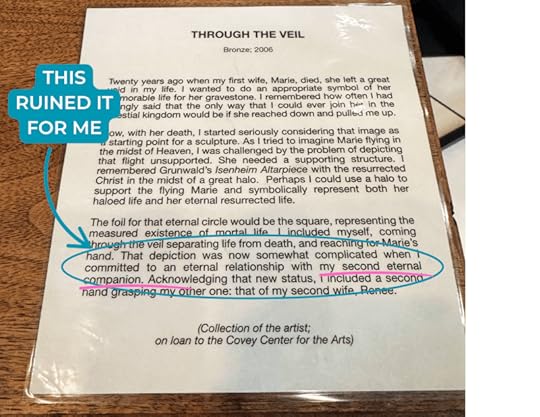
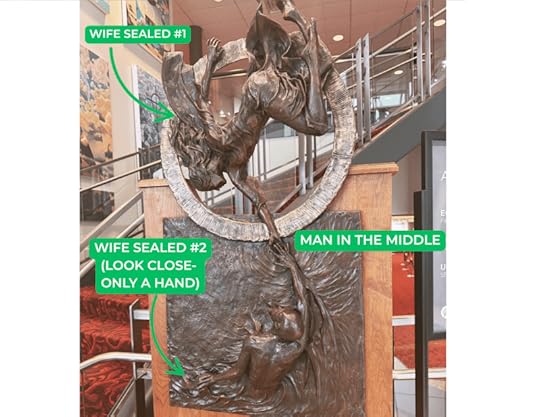
My blood ran cold. That tightening in my chest rose before I could even name it. What started as a tribute had quietly turned into a celebration of a theology that has left deep scars.
It’s the same doctrine that allowed early Church leaders to coerce teenage girls—like Fanny Alger and Helen Mar Kimball—into becoming plural wives, and to use their power to claim women already in committed marriages, like Zina Huntington Jacobs.
The same doctrine that defined the lives of so many of my own ancestors—ancestors I trace through the polygamous lines in the FamilySearch app.
The same doctrine that caused my mother quiet anguish, as she struggled with the potential fate of becoming a “second wife” to a man still sealed to his ex-wife.
The same doctrine that had me, at 16 years old in Young Women’s, listing “must be older than me” right next to “priesthood holder” on my eternal companion checklist—because if he died first, maybe I’d be spared from a forced polygamous afterlife.
Even after marrying a man six years older, just like I’d hoped, the fear never left me. And in that moment, standing beside my daughter as she read the plaque, I felt it rise again.
So without missing a beat, I stopped her mid-sentence and gently pulled us away. I didn’t want her going on stage with that kind of story in her mind. I didn’t want to have the polygamy conversation in that moment. This was supposed to be a fun night. A celebration of her hard work and talent.
A few minutes later, she was off and on her way with a smile. I didn’t want to carry what I was feeling either. But the feelings lingered. They always do.
I imagined what would have happened if I hadn’t skimmed ahead of her reading out loud. How would I have explained it? She’s already been asking questions.
Why can’t girls be prophets or Church presidents?
Why couldn’t Mommy baptize her?
Why can’t she baptize people when she grows up?
I know her sharp, precocious mind won’t be okay with polygamy either. She’s already noticing the cracks— the structural, quietly accepted inequality between women and men.
Even though I no longer believe this doctrine comes from God, it still lives in my body.
The weight of it sits in my chest, coils in my stomach, and tightens in my shoulders. It’s in my nervous system, buried deep, passed down through generations of women who had no choice but to endure. My brain knows it isn’t real, but my body still flinches.
It’s embedded in the Church I grew up in.
It’s embedded in the temple, even as they try to make it less obvious.
It’s embedded in sealing practices that allow men to be sealed to multiple women, but never the other way around.
Many people I love still find deep meaning in the Church. And that’s great for them.
But for those of us who no longer believe, but are still tied to this doctrine through mixed-faith families, the trauma doesn’t just go away. Even if we’ve rejected the belief, the damage it causes is still bone deep.
This wasn’t an isolated experience. Just a week earlier, a man in a local networking group shared what many saw as a heartwarming story about how he’d found healing after losing his wife in childbirth and remarrying just under a year later. Hundreds of comments poured in with love and support for the photo he posted: his headstone, engraved with his name and the names of two women, each sealed to him in the temple.
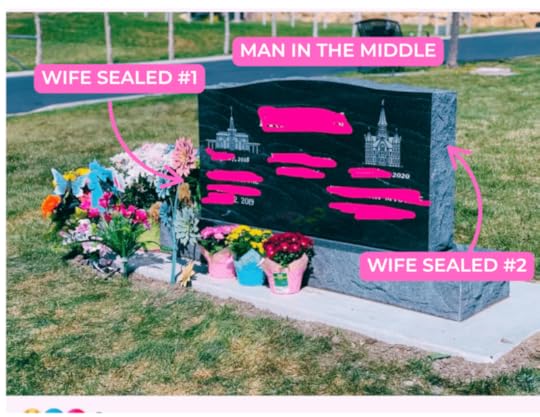
That’s how that woman’s resting place is portrayed, not as a person in her own right, but as the first wife in a polygamous afterlife.
In both instances, eternal polygamy wasn’t just tolerated. It was celebrated.
Let me be clear: I’m not against remarriage after loss. And I’m sure these men are good people.
To me—and to many other women—the problem is the doctrine. The idea that these marriages carry into the next life, and that we’ll be expected to become sister wives without consent.
And if the wife dies first? It doesn’t work the other way around.
I needed to talk about it. So I did.
That night, still shaken, I quickly shared a photo of the sculpture with my raw thoughts in a group of women in mixed-faith marriages (and shared about the gravestone a week before in the comments):
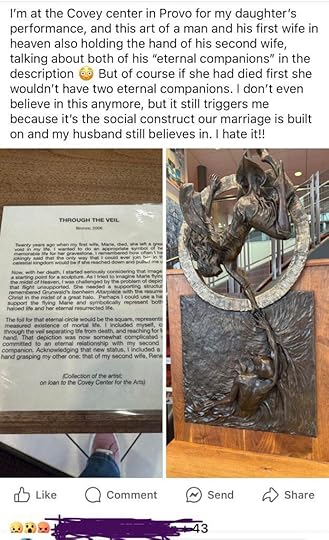
The responses were immediate and emotional:


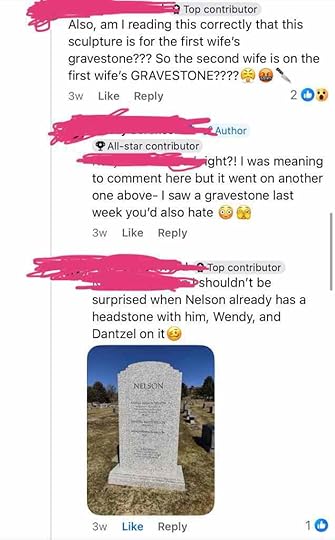
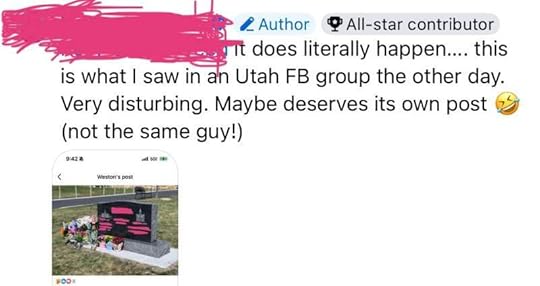



We hurt together. We raged a little. We held space for the grief that keeps finding its way back. Because this isn’t just history—it’s now.
As Carol Lynn Pearson says, it’s the “ghost of eternal polygamy.” And unless the men who hold the power choose to confront it, this is what we’re left with. The ones most harmed by this doctrine are the ones with absolutely no power to change it. Another generation carrying trauma while waiting for men to decide whether we deserve equality.
Because the truth is, women can’t fix this.
We can write. We can cry. We can walk away—and we are, in greater numbers than ever.
But the system still belongs to men. And only they can dismantle it.
I’m not holding my breath. I’ve lost all trust in this institution and its leaders.
I wish I could just be done with it all. And yet… I’m still tethered to this doctrine through family ties.
Someday, I’ll have to talk to my daughter about the belief woven into the sculpture we saw that night.
Not because I regret staying silent in the moment. I don’t.
But because she’ll ask.
Because she’ll notice.
Because she already does.
And when that day comes, I’ll tell her the truth:
This wasn’t created by God.
This was created by men.
She doesn’t have to accept it.
She doesn’t have to carry it.
She’s allowed to feel what she feels.
And she’s not alone.
And maybe, if she never has to spend years untangling this the way I did, this is what healing across generations looks like.
The anonymous author is a mother of three and a professional writer, coach, and education expert. She draws on both personal experience and professional insight to explore the quiet complexities of faith, family, and legacy.
June 10, 2025
Guest Post: My Sacred Place
Guest Post by Moira

As my ability to withstand the cognitive dissonance that has been inherent in my faith and relationship with the church all of my adult life has waned- I have found myself attending Sunday meetings less and less. It is strange to not spend Sunday’s inside the structured walls of an LDS chapel building. Instead I find myself in my garden, tending to my plants and flowers, worshipping in the soil.
A few weeks ago my husband and I decided to attend sacrament meeting, the first hour of our congregations Sunday meeting. I was missing the special spirit sacred spaces have- and the feeling of a community striving for betterness together. I have long loved the architecture of churches, and how they are the manifestation of people trying to bring heaven to earth. But I have often found LDS meeting houses to be spaces that rather than reach for the divine and envelop a worshipper in God’s love, seem preoccupied with order and adhering to a long list of rules and policies that do not create a welcoming environment. Inside our chapel with its tall arching wooden beams, which are very unique for an LDS building, is where our sacrament meeting is held.
This meeting is presided over fully by men, there may be women who speak to the congregation, but the closing speaker is always a man. Every Sunday as I grew up I saw only a group of men sit on the stand, in front of and above the congregation – in the physical space meant only for this with authority in the church- a space occupied only by men and the occasional woman who is invited to speak or sing. The stand is the focal point of chapel-pointing you towards the men who preside over the congregation and church.
This particular Sunday the relief society was going to sing a musical number during sacrament that they had been practicing the past few weeks. I was invited to join them, but because I had missed the practices I declined. I sat in the pews with the children and the men in the congregation and watched, where for the first time in my life all of the men left the stand, and the space was filled entirely and solely by women.
As their voices sang, tears streamed down my face as I realized this was the first, and likely the only time that I would see only women on the stand. My husband squeezed my hand knowingly recognizing the significance and pain this moment held for me. I can’t remember the song they sang-but I’ll never forget the longing and heartache I felt in that moment. This place that was meant to be sacred and for worship had instead for me become a painful reminder of all the hurt I had felt in these walls while searching for God and worshipping.
I have not attended church since then, I have found it too painful to be a space where I know that as qualified, educated and experienced as I am, that I will always be considered less than, and unqualified for leadership compared to the least qualified man in my congregation simply because I cannot hold the priesthood because I am not a man.
I long for the day when women are provided truly equal opportunities to worship and participate in the church. I long for the days when the church is more transparent and honest about its financial practices, I long for the day when LGBTQIA+ members will be welcomed and celebrated fully and when racism is abhorred and the church takes accountability for past harms. Until that day, I am not sure if I will attend Sunday services again, but I will be in my garden, for I have found that my garden is also a sacred place. My garden has no stained glass, no arching beams or stand, it has only soil, seeds, some weeds, and space for all who wish to come, to sit, to worship, to be. My garden is sacred because it recognizes I am sacred, and for now that is enough.

Moira lives on the East Coast with her husband, (whose last name she did not take because she is cool), her dog, her cat, and many plants. She works as a Senior Budget and Policy Analyst, and spends her free time in nature, hiking, gardening or taking pictures of plants to paint later.



